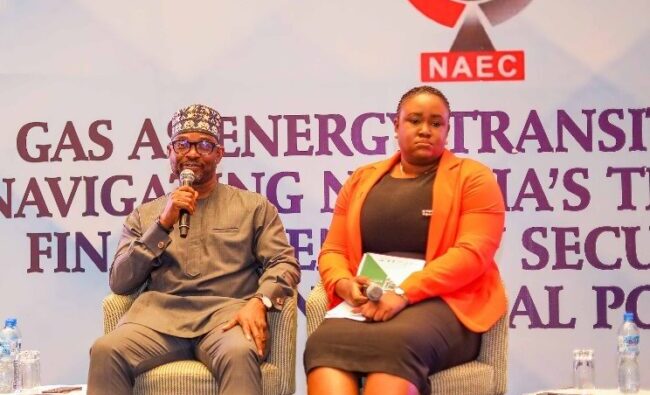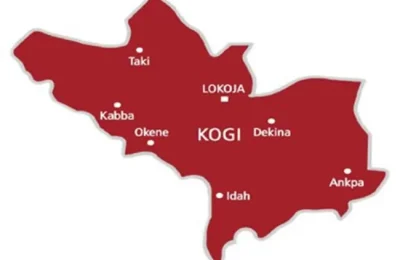
Nigeria’s abundant gas reserves offer immediate solutions to the nation’s energy challenges if effectively leveraged and managed, according to Abiola Lukman Lawal, Managing Director and Chief Executive Officer of Eterna Plc.
He called on Nigerians to adopt the use of Compressed Natural Gas (CNG) for transportation and Liquefied Petroleum Gas (LPG) for cooking, explaining that gas is a viable and cost-effective alternative that requires greater awareness.

Speaking during the second-panel session titled “Driving Energy Sufficiency in the Downstream Sector Through CNG and LPG” at the 2024 NAEC Annual Strategic International Conference in Lagos, Lawal highlighted the benefits of CNG and LPG in the downstream sector.
He stated that the adoption of these gases would lead to a reduction in greenhouse gas emissions. “Additionally, there will be cleaner combustion compared to traditional fuels, cost savings for consumers and businesses, and the creation of more jobs in the CNG and LPG supply chains,” he said.
The conference was themed “Gas as Energy Transition Fuel: Navigating Nigeria’s Trilemma of Finance, Energy Security, and International Politics.”
Regarding the federal government’s efforts to ensure the circulation and accessibility of these gases, Lawal pointed to the launch of Nigeria’s Decade of Gas Initiative, the Presidential CNG Initiative (PCNGi), and the installation of CNG stations aimed at improving efficiency.
He mentioned that “12 new CNG stations were commissioned in Lagos and Abuja in 2024, with plans for 35 additional CNG stations across various geopolitical zones.”
Lawal explained, “The Presidential CNG Initiative was launched in 2023 to alleviate the hardships caused by fuel price increases, particularly in transportation (via buses). The initiative includes the Conversion Incentive Programme, which provides either free or heavily discounted car conversions.”
He also noted that the Standard Organisation of Nigeria has introduced 80 standards covering various aspects of CNG utilisation, including production, storage, transportation, and appliance compatibility.
“The Decade of Gas initiative, launched in 2021, is focused on transforming Nigeria into a gas-powered economy by 2030 through a series of policy reforms, maturation of gas supply projects, expansion of gas infrastructure, capacity building, and robust investment attraction strategies.”
Lawal noted that Nigeria’s energy sufficiency can be achieved through CNG and LPG if critical stakeholders collaboratively invest in the gas sector. He further suggested large-scale investment in gas infrastructure, stating that $20 billion is required annually for this purpose.
“The Presidential CNG Initiative plans to raise over $350 million for CNG infrastructure by 2027. Additionally, $750 million is needed to develop LPG transport and retailing infrastructure.”
He emphasised the importance of policy and regulatory reforms to encourage private sector engagement and investment, proposing measures such as:
- Tax credits and rebates for purchasing CNG vehicles and converting existing vehicles to CNG.
- Grants and low-interest loans to promote private investment in CNG and LPG infrastructure.
- Championing consumer sensitisation efforts to create awareness of CNG and LPG as viable alternatives to oil.
- Educating the public about the environmental and economic benefits of CNG and LPG through media campaigns, workshops, and community programmes.
- Incorporating information about CNG vehicles and their benefits into driver education and training programmes to inform new drivers about CNG as a viable alternative to conventional fuels.
Also speaking, Adelanke Dayo-Adepoju, Major Energies Marketers Association of Nigeria (MEMAN) gas and renewable specialist, who represented Executive Secretary Clement Isong, noted that the association advocates for cleaner and more sustainable energy solutions through the promotion of natural gas (CNG and LPG), solar power, and biofuels like ethanol. He added that they work closely with partners to encourage the adoption of renewable energy practices in Nigeria.
According to her, MEMAN expressed appreciation for the government’s new fiscal incentive under the VAT Modification Order 2024, which exempts vital energy products and infrastructure from VAT. These products include diesel, feed gas, LPG, CNG, electric vehicles, LNG infrastructure, and clean cooking equipment, aligning with MEMAN’s advocacy for sustainable energy solutions.
ALSO READ THESE TOP STORIES FROM NIGERIAN TRIBUNE







